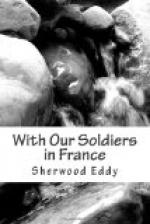Then there arose the problem of how to keep these men in touch with their households in isolated and illiterate villages in India. Mr. Hume, one of the secretaries in Lahore, devised a far-reaching plan whereby every letter was forwarded through missionaries or Christian workers or officials to the distant home of the soldier. The whole community gathers to hear the news from the Indian regiment on the other side of the world, and a shout goes up from the village street when they learn that their brave Sepoy is not dead, as rumor had whispered. A message is sent back in eager gratitude from the wife, children, and neighbors, and from the united heart of the little village to the distant soldier and his fighting comrades. The Red Triangle has spanned the gulf from the winter cold and the dreary trenches in France to the little village on the plains of sunny India, and the grateful hearts at both ends somehow dimly know that all this silent ministry is in the name of the White Comrade who is the Friend of man.
Here in France the hut must stand as the friendly home that gathers up all the best traditions of Indian life. It takes the place of the banyan tree in the heat of the day, the village well, and the meeting place for the men in the cool of the evening. Even beyond all hopes it has proved a potent factor for unity, harmony, and peace in a time of unrest. It draws the British officers and the Indian men closer together, and the Indian secretaries have served time and again as the mediators between the two, who could so easily have misunderstood each other. It provides a common meeting place between the caste-ridden and divided Indians themselves, who had no other ground of unity.
Here are men of different languages and races and traditions, from the Gurkhas, the brave little hill men, to the stalwart Pathans, who come as fighting men from far beyond the borders of India for the sheer joy of battle. The chances for supposed loot in the fabled wealth of the West and the accumulation of merit by slaying the “unbelievers” of the enemy, prove an added attraction to men born and bred in border warfare. Here also are men of three separate creeds, who have often fought with one another over the issues of their faiths—the big bearded Sikhs, with a soldier’s religion, the warlike Mohammedans, who fight according to their Koran, and the caste-ridden Hindus.
As you walk among the tents the smoke of the fires hangs heavy over the camp; there is the familiar sound of the bubbling rice pots, the smell of pungent curry, the babel of many oriental tongues, and you seem to be back in the very heart of India itself. We gather with the reverent Sikhs for their religious worship. They meet morning and evening for their prayer service, and turn out almost in a body for the weekly Sunday meeting. The service consists principally of singing and the reading of their sacred scripture, the Granth. Seated on the ground, the men show deep reverence, and seem to have a sense of the presence of God in their midst. Their religion has a real restraining influence and there is at present little immorality amongst them.




